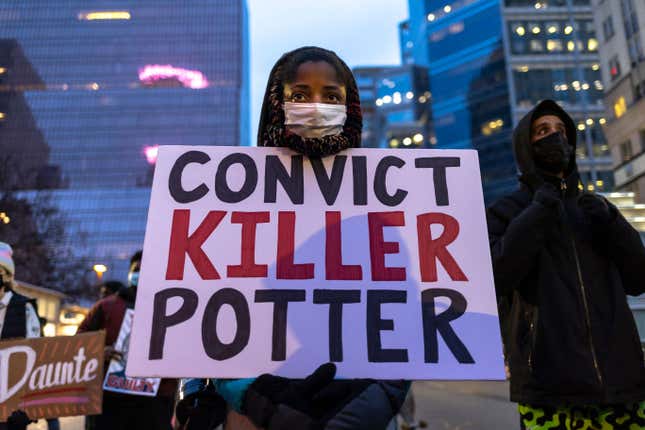
“Carrying a badge and a gun is not a license to kill,” Prosecutor Erin Eldridge said during closing arguments on Monday.
The defense rested last Friday on the eighth day of trial for former Minnesota officer Kim Potter, who shot and killed 20-year-old Daunte Wright during a traffic stop that Potter said “just went chaotic.” The defense and prosecution delivered closing statements in front of a mostly white jury on Monday. Potter is charged with first and second-degree manslaughter and testified through tears in her own defense last Friday.
According to the Guardian, the prosecution honed in on Potter’s “mistake” of drawing her gun instead of her taser. During closing statements, Eldridge argued that the 26 year police veteran was not within her right to kill Wright like the defense claims. Attorney Earl Gray argued that Wright “caused his own death, unfortunately,” according to WCCO, by trying to flee the traffic stop.
From the Guardian:
“I remember yelling, ‘Taser, Taser, Taser,’ and nothing happened, and then he told me I shot him,” Potter said through tears. Her body camera recorded Wright saying, “Ah, he shot me.”
Potter’s attorneys argued she made a mistake but would have been justified in using deadly force if she had meant to because Sgt Mychal Johnson was at risk of being dragged by Wright’s car.
Prosecutor Erin Eldridge noted that Potter told a defense expert she didn’t know why she drew her Taser. Quoting from the expert’s report, Eldridge said Potter told him: “I don’t have an answer, my brain said grab the Taser.”
Potter testified she didn’t recall saying that.
Prosecutors have argued that Potter had extensive training about Taser use and in use of deadly force, including warnings about confusing the two weapons. Eldridge got Potter to agree that her use-of-force training was a “key component” of being an officer. Potter testified that she was trained on when to use force and how much, and that there was a department policy that dictated what officers could or could not do.
“A mistake is not a crime,” Gray said. He argued that Potter could not be found guilty of the first-degree manslaughter charge because the charge requires a person to be acting recklessly when committing a “conscious or intentional act.”
“How could she have recklessly handled a firearm if she didn’t even know she had one?” Gray said, according to WCCO.
If convicted, the first-degree manslaughter charge carries a sentence just over seven years in prison and the second-degree calls for four years. The prosecution has already said they would be seeking the maximum for both charges.
“In the walk of life, nobody’s perfect. Everybody makes mistakes. Some of those mistakes are small mistakes, but some of them are very serious,” Gray said.
More from the Guardian:
Before Potter took the stand, a defense witness testified that officers can mistakenly draw guns instead of Tasers under high-stress situations because ingrained training takes over.
Laurence Miller, a psychologist at Florida Atlantic University, said the more someone repeats the same act, the less they have to think about it and there can be circumstances during a stressful situation in which someone’s normal reactions may be “hijacked”.
Some experts are skeptical of the theory. Geoffrey Alpert, a criminology professor at the University of South Carolina who is not involved in the trial, has said there’s no science behind it.
Prosecutor Matthew Frank, in a rebuttal to the defense’s closing statements, said the defense’s claim that Wright caused his own death is “factually wrong and legally wrong.” He also told the jury that there was no evidence to prove that deadly force was even necessary. The defense attempted to motion for another mistrial which was shot down by the judge.
The jury is now deliberating and will be allowed to resume after the holidays if they need more time.

